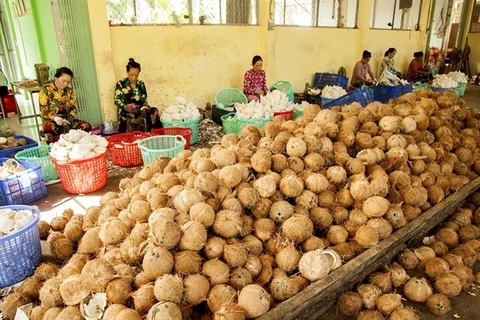Hanoi (VNA) - Deputy Prime Minister Le Minh Khai outlined eight crucial missions to develop Vietnam's collective economy, as he attended the eighth National Farmers' Forum on October 12.
The forum in Hanoi, under the theme of "Farmers' Union developing collective economy", was organised by the Vietnam Farmers' Union, in association with the Ministry of Agriculture and Rural Development.
"Collective economy is an important economic component that must be strengthened and developed alongside the state economy to become a solid foundation of the national economy," Deputy PM Khai said.
"Emphasising that the development of the collective economy is an essential and objective trend, it is a task of the entire political system."
According to Khai, the Government and the Party see the collective economy as one of four important sectors of the economy, and will create Vietnam’s economic power.
Khai ordered leaders of localities and authorities, as well as the Vietnam Farmers' Union, to focus on executing eight crucial missions.
One: It is essential to have a correct and comprehensive understanding of the nature, position, role and importance of the collective economy in the market-oriented socialist-oriented economy.
To fulfill this requirement, the Ministry of Planning and Investment should coordinate with relevant agencies in urgently revamping the National Steering Committee on the Collective Economy in accordance with the guidance of the Central Party Committee.
Two: Farmers' unions at all levels should continue to promote, mobilise and guide the establishment of more cooperatives and cooperative groups based on existing agricultural associations and vocational groups.
The general goal is to have 140,000 cooperatives, 45,000 cooperative groups, and 2 million members nationwide by 2030. Newly established cooperatives and cooperative groups should promptly apply advanced scientific and technological achievements to their production.
Three: The "Vietnam Farmers' Union's Involvement in Developing the Collective Economy in Agriculture" project should be quickly proposed to the Prime Minister for ratification. The project must ensure feasibility and mobilise social resources, encourage innovative approaches and establish sustainable linkages.
Four: For ministries, sectors, and localities, in line with their functions and assigned tasks, they should focus on researching and resolving the difficulties and challenges raised by cooperative representatives at the Forum.
Five: It is necessary to enhance the effectiveness of state management in the field of the collective economy. Prioritise resources, allocate funds and appoint officials to monitor the innovation of the collective economy and cooperatives in organisations and units from the central to local levels.
Six: There is a need to strengthen international cooperation to attract resources for the development of the collective economy and cooperatives in agriculture, expand markets, promote cooperative products, and provide training and development for human resources within cooperative organisations.
Seven: It is of utmost importance that cooperatives take an active, innovative approach and transform their mindset and practices, shifting from agricultural production to agricultural economics with integrated added value.
The products they produce should have a strong brand, high quality, and be market-responsive, particularly aligning with the "One Commune One Product" (OCOP) program. Cooperatives should also swiftly embrace digital transformation in their production and business activities, actively apply new scientific and technical advancements to modernise production processes, and enhance product competitiveness.
Eight: The Vietnam Farmers' Forum is a significant initiative that should be maintained as a beneficial platform for farmers to share practical production and business experiences. It should also provide suggestions and recommendations to the Government, the Prime Minister, and relevant ministries, departments, and local authorities to address challenges promptly with effective solutions.
The Vietnam Farmers' Union should actively engage in promoting, mobilising, and guiding the establishment of cooperatives. Build mechanisms and policies to train, develop, and attract a young, educated workforce to work in cooperatives, meeting the increasing demands for value chain development and international integration.
 Chairman of the Vietnam Farmers' Union Luong Quoc Doan visits agricultural product booths. (Photo: Vietnam+)
Chairman of the Vietnam Farmers' Union Luong Quoc Doan visits agricultural product booths. (Photo: Vietnam+) The event also introduced the Vietnam Good Farmers' Network, which connects more than 800 approved farmers, as well as model cooperatives to share farming experiences.
The initiative was started by the Nông Thôn Ngày Nay (Rural Today) newspaper.
"The selected individuals in the Good Farmers' Network are the best of the best, models, pioneers and inspirations for other farmers," said Nguyễn Văn Hoài, Deputy Editor-in-chief of the newspaper.
The formation of the Vietnam Good Farmers' Network aims to gather and connect outstanding Vietnamese farmers from different periods, facilitating exchanges, learning, market exploration, and investment cooperation.
It also serves as a platform for sharing experiences and exchanging information in agricultural production, through means of training, farm visits, and social programs.
The network will primarily operate online, but there will also be in-person events planned./.
























